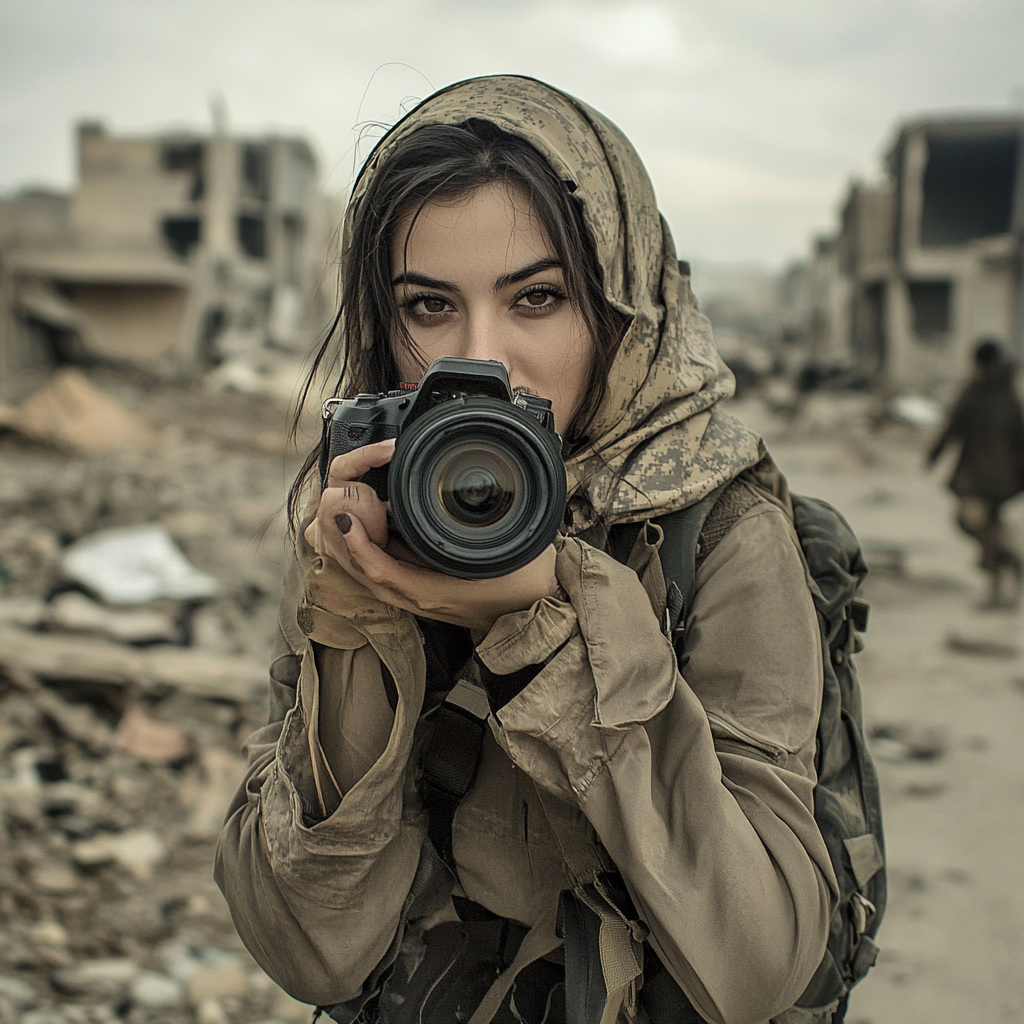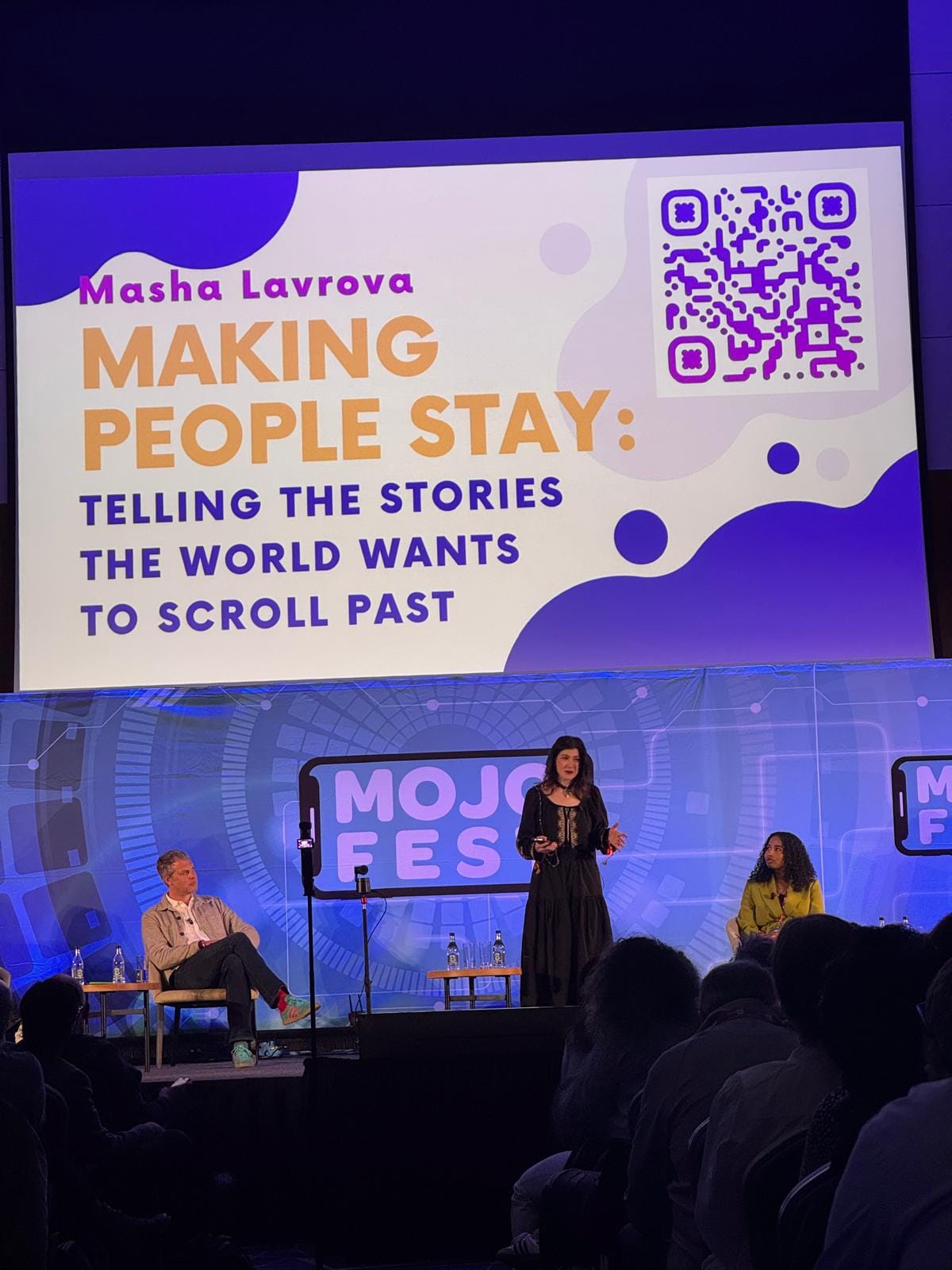This Is What Journalism Looks Like

A reflection on two journalists. One not with us. One still fighting.
I have been trying to write this piece for a while... it's not like me. But this felt important, at least to me.
Last month Fatima Hassouna was killed. On April 16th her life was taken. Then across the last couple of weeks I have watched Masha Lavrova operate on what looked like 3-4 hours sleep over two or three days more than once to tell the story of the people of Kyiv. Bombs and missiles going off relentlessly through the night.
We see lots of stories online. How many of you have looked at the missiles over the weekend... or seen the destruction of Gaza or Ukraine literally daily... I feel humanity in a way has become desensitised and it is harder for content, for stories and above all else, the truth to get through.
So when I really thought about both these women, these journalists - video or photo, these storytellers, these creators.... when I thought about their stories, I wanted to write something. I went from anger, to sadness, to frustration to where we are now... honour.
I want to honour who they are, what they've done, what they've sacrificed, what Masha continues to do, what Fatima died for and what I feel when I see and think about them. You'll feel all these emotions throughout this piece... as it should be for what they have sacrificed.
"If I die, I want a loud death" - Fatima Hassouna
I didn’t know Fatima Hassouna.
But I followed her work. She was a video producer based in Gaza, and over the last 18 months, she’d quietly and steadily documented the war around her. Her footage was powerful. The story was clear. A story certain people in the world DO NOT want told.
It didn’t push an agenda. It was honest. It simply showed what was happening families living in ruin, women making food in bombed out kitchens, children finding fragments of normality under a sky that never stayed calm for long.
It was what the world should be seeing, through a real lens on the ground facing injustice every day and every night. Through the eyes of a storytelling journalist.
She was bearing witness to Genocide, she was documenting the real story on the ground as international media is banned from Gaza "for safety" reasons. Fatima was showing us and telling us the real stories. Showing us the real
My heart broke last week. It was the week Fatima's work was selected to screen at Cannes... an achievement any filmmaker would be proud of, but less than 10 hours after that announcement... Fatima was killed.
An airstrike took her life and the lives of ten members of her family. She wasn’t a combatant. She wasn’t in uniform. She was holding a camera. She stayed in Gaza because she believed the story had to be told. And she paid for it with her life but her legacy will live on. Fatima was my motivation for writing this piece as was Masha after meeting her a few weeks ago.
This isn’t the kind of loss you scroll past. It should stop you. It should sit with you. I can tell you all, it has sat with me. Fatima wasn’t martyr. She was an inspiration. A powerhouse with the kind of strength and sense of purpose that I really wish far more of humanity had.
She was doing her job. And yet, for people like her, that job is often the most dangerous thing they could choose to do. Tell the truth openly, honestly. To share the story, no matter the consequences, so the world can see what this genocide in Gaza looks like.
Fatima wasn’t there to fight. She was there to document. And she stayed when many of us would have left. Even when she knew the risks. She stayed.
She died because she believed in her people. She believed in their future. She believed the story was worth telling, even if it meant giving her life to do it. She didn’t want her death to be forgotten. And she made that clear, long before it came.
Fatima knew the risks. She lived with them daily. In the months leading up to her death, she had already lost eleven members of her family. Her home had been destroyed. She had been displaced again and again. And still... she filmed. She wrote. She posted. She showed the world what she was living through.
There was one line she posted online that hit me in the chest the first time I read it... and it’s never left me since.
“If I die, I want a loud death. I don’t want to be just breaking news, or a number in a group. I want a death that the world will hear. An impact that will remain through time. A timeless image that cannot be buried by time or place.”
Those words weren’t just sentiment. They were instruction. A demand. A promise.
And she kept that promise. Today, I want to follow through with a promise I made... to talk about your story Fatima, to share it with a world that may not have seen it.
Just 24 hours before she was killed, it was announced that a documentary telling her story would premiere at a film festival in France. Put Your Soul on Your Hand and Walk, directed by Sepideh Farsi. It followed her through a series of video messages. The laughter. The fear. The frustration. The weight. Fatima was meant to be married that very week. Instead, she became the subject of a film that will now serve as part of her legacy.
That’s what this piece is about. The journalists who embody true journalism. The journalists that are willing to sacrifice their life, their minds... everything, for the truth to be told, for the story to be shared.
To these journalists... I admire you, I respect you and I spend more time than I would care to admit thinking about what these people, these journalists go through and thinking, could I ever be that strong... what if this had happened here?

Talking about strength, I have only been following Masha for maybe 6-8 weeks, since the last week of April when I saw her speak at an event in Dublin.
I met Masha a few weeks ago at a conference called MojoFest. She stood out straight away... smart, articulate and full of purpose. She spoke about mobile video in war zones and telling stories and creating content that stop you scrolling. Masha spoke about how it’s become one of the most important tools for frontline journalism. It was just passionate yet calm and controlled insights, into what it means and what it takes to document a war when you’re in the middle of it.
She’s a video producer and host at the Kyiv Independent. And she lives what she reports. I follow her online. I see her updates. I’ve seen her speak from bomb shelters, filming at 3am after missile strikes shook her building. I’ve seen her instagram stories from basements while air raid sirens echo in the background and all through the night. There’s no drama in her tone. Just honesty... the look on her face, the feeling in her eyes... it is powerful journalism.
And that’s the thing, she could leave. She lived abroad for eight years. Australia. Global contracts. A different life. But she came back to Ukraine in 2023. She chose to return. She chose to stay. Because the story matters. The world needs to see it.
There’s something that’s never left me since MojoFest. She told a story about working on a shoot where the bombing had been relentless previously. And how, in order to complete the scene, they decided to split the crew, half on the left, half on the right, just in case a bomb hit one side.
That way, someone would survive. Someone would get the footage.
That is the level of conversation journalists like Masha have. That is the mindset they carry. That’s what staying looks like.
There’s this phrase we throw around too easily in our world: “tell your truth.” But Fatima and Masha aren’t telling their truth. They’re telling the truth. They’re bearing witness when it would be easier to disappear.
They live in fight or flight. They report with no sleep. They make videos knowing it might be their last. The fear they live with, the fear of being next and they still go. Still show up. Still put themselves forward. Still walk into the story instead of away from it.
Imagine the exhaustion. Imagine what they mean when they say they’re tired, compared to how we say it. Imagine the adrenaline constantly in their body. The conversations they’re part of. The normalisation of danger. Imagine what it means to continue working, creating, building, documenting, with that level of risk pressing against your life every single day.
I work in media. I build media systems. And sometimes I look at what the wider media industry has become... how much of it is curated, manipulated, sanitised... is just brutal propaganda to manipulate our minds...
And I know deep down that the kind of journalism from Fatima and Masha is what truly matters. Real stories from those feeling the pain the most.
People like Fatima. People like Masha. They don’t just write history. They risk everything to make sure it can’t be erased. They are not symbols. They are not martyrs. They are heroes.
And what they represent is that deep commitment to country, to story, to values, to truth, that is the kind of media I want to stand beside.
That’s the kind of journalism Equitas will always honour. Not performative. Not manufactured. Just real. With purpose, with heart, with everything they have.
Any journalist worldwide that is in a war zone, that is on the frontline of whatever story they are sharing with the world, that are willing to sacrifice everything... I have so much respect for you. An inner strength and sense of purpose like few others...
Fatima is not with us anymore. Masha is still fighting every single day... to exist, to survive, to rebuild... and share her peoples truth with the world. This is not a tribute. It’s a reminder.
This is what a real journalism looks like.
Until Next Time,
Shane


